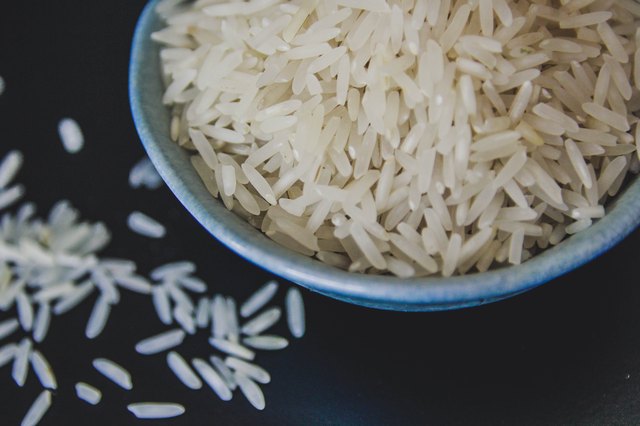If you’ve seen mentions of using rice water for weight loss on TikTok, you might be wondering what the trend is all about — and whether it actually works.
The internet says yes. In fact, TikTok users usually refer to rice water as “rice-zempic” because they claim it’s a DIY alternative to medications like Ozempic that cause weight loss.
Nutrition experts aren’t convinced, though. Here’s what two registered dietitians have to say about the rice water trend, plus what to keep in mind if you decide to give it a try.
First, What Is Rice Water?
Rice water or “rice-zempic” is a starchy liquid made from soaking uncooked rice in hot water overnight and adding a squeeze of fresh lime juice. It’s typically drunk in the morning on an empty stomach.
Proponents say it helps them lose weight — up to 14 pounds in a week — by curbing hunger, nixing sweet cravings, and even helping them go to the bathroom more frequently.
Does Rice Water Help You Lose Weight?
Despite the social media buzz, rice water is not a proven method to help you shed pounds. “Currently, there is no strong scientific evidence to suggest that drinking rice water directly contributes to weight loss. Most weight-loss strategies are rooted in creating a calorie deficit through a balanced diet and regular exercise, combined with sustainable lifestyle changes,” says dietitian Jessica Crandall, RDN, medical advisor at FuturHealth.
It’s possible that the starch in the water could contribute to feelings of fullness, causing someone to eat less and take in fewer calories during the day, says Brannon Blount, RDN, a nutrition expert based in Danville, Virginia.
However, replacing calories from food with rice water isn’t sustainable for the long-term. And once a person goes back to eating their normal amount, they’ll regain any of the weight they may have lost, Blount says.
In addition to the fact that rice water won’t support sustainable weight loss, there are some other downsides to know about.
- Low in nutrients. Drinking rice water to replace some of the calories in your diet could lead to nutritional deficiencies. “It contains carbohydrates but little protein, fat, or fiber, which are essential for a balanced diet,” Crandall says.
- Could raise blood sugar. Consuming lots of starchy carbs can cause your blood sugar to spike. That could make it harder to maintain healthy blood sugar levels (especially if you have diabetes), Blount notes. Over time, frequent blood sugar spikes could even lead to weight gain, notes August 2018 research in JAMA Internal Medicine.
- Could lead to food poisoning. Uncooked rice may contain spores of Bacillus cereus, a type of harmful bacteria that can potentially lead to vomiting and diarrhea, according to experts at McGill University.
How to Use Rice Water for Weight Loss
Drinking rice water is unlikely to help you lose weight and keep it off in the long run, Crandall and Blount say. If you’d like to give it a try, you’ll have the best chance for success if you try it alongside proven weight-loss methods, including:
- Eat fewer calories. Aim to curb your intake by around 500 calories per day to lose 1/2 to 1 lb per week, recommends the Mayo Clinic. “Swap high-calorie foods for lower-calorie options, such as replacing regular soda with diet soda if you drink it regularly. Practice portion control by measuring servings and sticking to recommended portion sizes,” Blount suggests.
- Choose nutrient-dense foods. Think: fruits, vegetables, lean proteins, whole grains, and healthy fats. They’ll help you stay satisfied while ensuring you get the vitamins and minerals you need. Make sure you have a source of protein and fiber in each meal or snack too. “Both promote satiety and support metabolic health,” Crandall says. This is especially important if you’re drinking rice water, because it can put you at risk for nutritional deficiencies, Blount notes.
- Get more physical activity. Try to get at least 30 minutes of aerobic activity most days of the week (like walking, swimming, or bicycling) and perform some kind of resistance training at least twice a week, recommends the Centers for Disease Control and Prevention. Aerobic exercises help you burn extra calories, while resistance exercises build muscle to help boost your metabolism, Crandall explains.
- Stay hydrated. On its own, drinking water probably won’t lead to weight loss. But getting enough fluids could help keep your metabolism humming at a steady rate and give you an energy boost so you can be more active, according to Johns Hopkins University. (You’ll get these benefits from plain H20 by the way — no rice needed.)
How to Make Rice Water for Weight Loss
Because rice water is a home hack for weight loss, there’s no one official way to make it. It usually includes three ingredients:
- 1/2 cup unrinsed white rice (rinsing removes the starch from the outside of the rice)
- 1 cup warm water
- Juice of 1/2 lime
To make the rice water, place the rice in a bowl or container and pour the warm water over top. Let it steep for at least 30 minutes (or as long as overnight), then strain the rice and stir in the lime juice before drinking.
Rice water may help you feel a little fuller, but it’s not a proven method for long-term, sustainable weight loss. If you want to try it, be sure to incorporate it into a routine that includes proven weight-loss methods like eating more nutrient-dense foods and getting plenty of exercise.
Read the full article here

